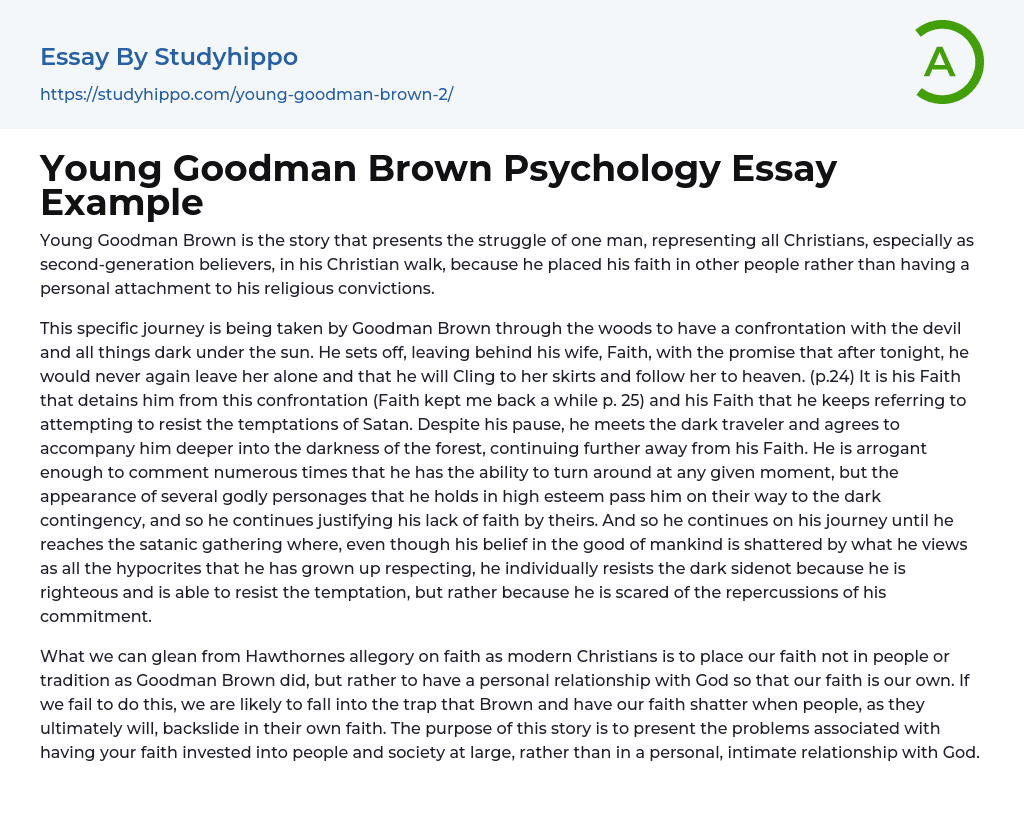Young Goodman Brown is a story that depicts the struggle of an individual, embodying all Christians, particularly those who are second-generation believers, in their journey of faith. This is highlighted by the protagonist's reliance on others instead of cultivating a personal connection to their religious beliefs.
In this passage, Goodman Brown embarks on a specific journey through the woods to confront the devil and all things dark. He leaves his wife, Faith, behind with a promise to never leave her alone again and to follow her to heaven. It is his faith that prevents him from engaging in this confrontation, and he consistently mentions his faith while trying to resist Satan's temptations.
Despite his hesitation, he encounters a shadowy traveler and agrees to venture further into the forest, separating himself from his faith. He arrogantly claims
...that he can turn back at any moment but when he sees respected figures of godliness heading towards the sinister gathering, he justifies his lack of faith based on theirs.
He continues on his journey and eventually reaches the gathering of demonic forces. Witnessing what he perceives as hypocritical individuals whom he once admired destroys his belief in humanity's goodness. However, individually resisting the dark side does not arise from righteousness but from fear of potential consequences if he fully commits.
The message conveyed by Hawthorne's allegory about faith for modern Christians is to trust in God rather than in people or tradition, just like Goodman Brown did. It is important to cultivate a personal connection with God in order for our faith to be genuine. Neglecting this could lead us to the same predicament as Brown, where our faith is easil
shattered when people inevitably lose their own faith. This story serves to highlight the difficulties that arise when we place our faith in others and society instead of nurturing a deep, personal relationship with God.
- Abnormal Psychology essays
- Social Psychology essays
- Developmental Psychology essays
- Jean Piaget essays
- Positive Psychology essays
- Classical Conditioning essays
- Counseling essays
- Psychoanalysis essays
- Educational Psychology essays
- Behaviorism essays
- Authority essays
- Operant Conditioning essays
- Maslow's Hierarchy Of Needs essays
- Mental Health essays
- Personality Psychology essays
- Psychotherapy essays
- Family Therapy essays
- Stanford Prison Experiment essays
- Abraham Maslow essays
- Erik Erikson essays
- Cognitive Psychology essays
- Sigmund Freud essays
- Attachment Theory essays
- Supersize Me essays
- Individual essays
- Infant essays
- Childhood essays
- Adolescence essays
- Growth Mindset essays
- Is Google Making Us Stupid essays
- Childhood Memory essays
- Positive Attitude essays
- Reinforcement essays
- Archetype essays
- Maturity essays
- Deception essays
- Certainty essays
- Conformity essays
- Aggression essays
- Behavior essays
- Human Behavior essays
- Obedience essays
- Adult essays
- Procrastination essays
- Morality essays
- Altruism essays
- Human Sexuality essays
- Role Model essays
- Perseverance essays
- Expressive essays




